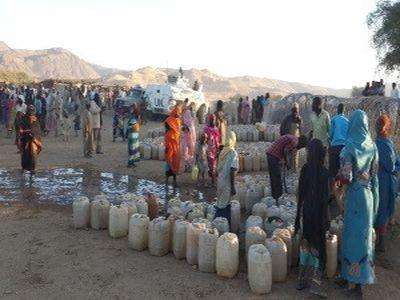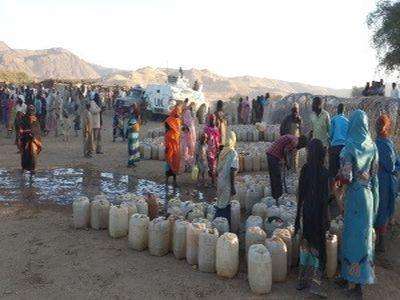Fighting that began in mid-January in the Jebel Marra and Jebel Si areas of North Darfur, Sudan, has forced some 58,000 people—mostly women and children—to flee in search of protection. Many have abandoned their homes, farms and livestock for the relative safety of camps near the towns of Tawilla and Sortony. This part of Darfur is a tough semi-desert environment where little grows and temperatures regularly climb above 100 degrees Fahrenheit.
As the displacement continues, it is the very young, sick, and elderly who find themselves most at risk as they trek some 50 kilometers [about 31 miles] from their homes to Tawilla. Currently Doctors Without Borders/Médecins Sans Frontières (MSF) provides emergency aid to an estimated 40,000 displaced people arriving in Sortony and another 18,000 in Tawilla in need of water, food, and medical attention.
"We need to look at both the immediate and future needs of the displaced," says David Therond, MSF head of mission in Sudan. "We need to guarantee that their immediate needs are met until the security situation normalizes."
Local authorities and international nongovernmental organizations are anticipating an increase in the number of displaced people arriving in the region. Before the fighting, the area had an estimated population of 140,000, of which about 70,000 have already departed.
"In these first weeks of the intervention we have focused on delivering non-food item (NFI) kits to the displaced who often arrive with nothing," says Therond. "These provide some basic cooking and cleaning utensils as well as some materials from which they can build a shelter."
MSF is also looking to ensure a steady supply of clean drinking water in the camps. Currently, about 9.5 liters of water per person per day is provided, but this is not enough. The goal is to increase this to 15 liters.
The camps also need to be provided with a basic sanitation system. With so many people living so close together, hygiene is a big concern. So far, MSF has constructed the first 250 of an expected 700 latrines.
In the coming weeks, MSF is planning to launch a vaccination program for measles and polio as well, in collaboration with the Sudanese Ministry of Health.
MSF started working in Darfur in 1985. MSF is a medical humanitarian organization that delivers emergency aid to people affected by armed conflict, epidemics, natural disasters, and exclusion from health care. MSF offers assistance to people based on need, irrespective of race, religion, gender, or political affiliation. Currently, MSF is working in Sudan in the states of North Darfur, West Darfur, White Nile and Gedaref.





